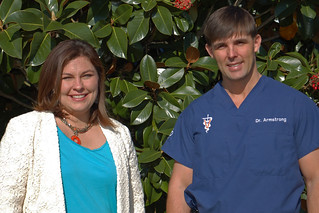Auburn Animal Sciences faculty member, alum named to 40 Under 40
Article body
An Auburn University faculty member in the College of Agriculture's Department of Animal Sciences and a veterinarian who is an alumnus of the department are among 40 young men and women from across the United and Canada being honored for the significant contributions they have made to North American's food system early in their careers.
Christy Bratcher, an associate professor of meat science and food safety in the animal sciences department, and Dr. Chance Armstrong, a veterinarian who earned his bachelor's degree in animal sciences in 2002, were named by Vance Publishing Corp.'s Agribusiness Group to this year's list of 40 Under 40 Award recipients.
The company announced the honorees earlier this month, calling the individuals "40 of the brightest leaders in the agriculture industry today." The 2014 recipients hail from farms, educational institutions, private industry, public agencies and commodity organizations.
Bratcher, who joined the Auburn faculty in 2008 after receiving her Ph.D. in animal science from the University of Missouri, has earned recognition regionally, nationally and beyond for her research, teaching and outreach programs in meat science and food safety. In her six-year career at Auburn, she has been awarded $6.7 million in extramural funding to support her work, including a $4.8 million federal grant she received in 2012.
In nominating Bratcher for the award, Auburn animal sciences professor and Extension specialist Frank Owsley cited not only her strong research program but also her continual efforts to help farmers and ranchers produce a marketable, sustainable product and her strong commitment to involving graduate students in her research programs.
Bratcher teaches four animal sciences courses, coordinates the department's muscle foods degree option and is faculty adviser to the Auburn University Collegiate Cattlemen and Cattlewomen. In addition, she is actively involved in state and national commodity organizations and provides training in food quality and food safety for retailers, processors and chefs.
Armstrong, an Abbeville native, enrolled at Auburn in 1998 and in 2002 received his bachelor's degree in animal sciences with a minor in poultry science. During his undergraduate years, he served on the College of Agriculture Student Council and as president of Auburn's Block and Bridle Club. He also was a member of his department's meats-judging team and represented Auburn in the American Society of Animal Science's Academic Quadrathlon.
In 2010, Armstrong was awarded his doctor of veterinary medicine degree from Auburn, graduating with highest honors. He then worked for two years as a veterinarian at an Okeechobee, Florida, animal hospital but in 2012 returned to Auburn as a clinical resident in farm-animal theriogenology, or reproduction, at the College of Veterinary Medicine's Vaughan Large Animal Teaching Hospital. Armstrong was nominated for the 40 Under 40 Award by Eufaula SimAngus cattle farmers Bruce and Billie Bush.
Vance Publishing will post profiles of all 2014 honorees online at 40under40ag.com and include them in the November and December print issues and on the websites of its nine agribusiness publications, which include The Packer, Ag Professional, Drovers CattleNetwork and Produce Retailer.
Related Media
Related Links
Media interested in this story can contact Communications Director Preston Sparks at (334) 844-9999 or preston.sparks@auburn.edu.
Auburn University is a nationally ranked land grant institution recognized for its commitment to world-class scholarship, interdisciplinary research with an elite, top-tier Carnegie R1 classification, life-changing outreach with Carnegie’s Community Engagement designation and an undergraduate education experience second to none. Auburn is home to more than 30,000 students, and its faculty and research partners collaborate to develop and deliver meaningful scholarship, science and technology-based advancements that meet pressing regional, national and global needs. Auburn’s commitment to active student engagement, professional success and public/private partnership drives a growing reputation for outreach and extension that delivers broad economic, health and societal impact.





